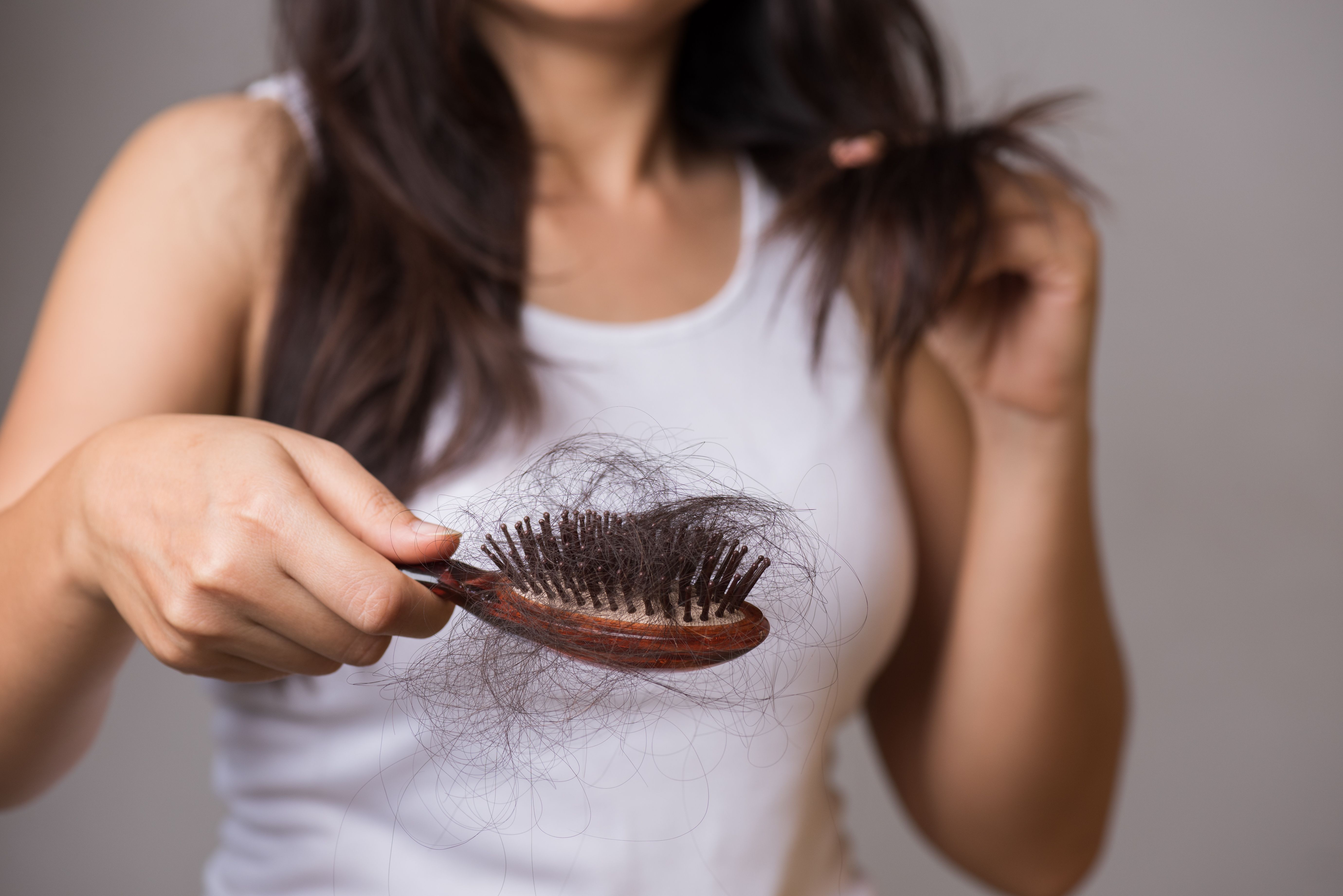- Center on Health Equity & Access
- Clinical
- Health Care Cost
- Health Care Delivery
- Insurance
- Policy
- Technology
- Value-Based Care
Deuruxolitinib Demonstrates Efficacy, Tolerability in Patients With Moderate to Severe AA
Posters suggest deuruxolitinib, a medication targeting specific cellular pathways, effectively promotes hair regrowth in patients with moderate to severe alopecia areata (AA) and results in minimal adverse events.
Woman experiences hair loss | Image Credit: Siam - stock.adobe.com

Posters presented at the 2024 American Academy of Dermatology Annual Meeting confirmed the efficacy and successful tolerability of deuruxolitinib, an inhibitor of Janus kinase 1 (JAK1) and JAK2 resulting in hair regrowth, in patients with moderate to severe alopecia areata (AA).
One poster1 focused on the efficacy of deuruxolitinib among adult patients aged 18 to 65 years in the multinational, phase 3, randomized controlled THRIVE-AA1 and THRIVE-AA2 trials. The study consisted of a placebo group, a group receiving 8 mg of deuruxolitinib twice daily, and a group receiving 12 mg of deuruxolitinib twice daily under a 24-week treatment period and 4-week safety follow-up (n = 267, 600, and 342, respectively).
Partial scalp hair loss was defined as a Severity of Alopecia Tool (SALT) score of at least 50 and less than 95. At baseline, 41.2% of the placebo group, 41.3% of the 8 mg group, and 41.8% of the 12 mg group had partial scalp hair loss. The study defined complete or near-complete scalp loss as a SALT score greater than or equal to 95, which was seen in 58.8% of the placebo group, 58.7% of the deuruxolitinib 8 mg group, and 58.2% of the 12-mg group at baseline.
The primary end point of the study was the percentage of patients with a SALT score less than or equal to 20 at week 24. Both doses of deuruxolitinib met the primary efficacy end point (8 mg, 31%; 12 mg, 40.3%). Differences in SALT score for both doses of deuruxolitinib vs placebo were identified as early as 8 weeks.
Statistically significant improvements in scalp hair regrowth were achieved with both doses of deuruxolitinib from as early as week 4, with a large proportion of patients achieving reductions in SALT scores greater than or equal to 40. The poster included a bar graph of the percentage of patients with a SALT score less than or equal to 10 at week 24 (placebo, 0%; 8 mg, 22.5%; 12 mg, 31.6%). As early as week 4, changes in the SALT score from baseline were noticeable for both dose groups vs placebo (P = .0013 vs placebo; P < .0001 vs placebo).
Another poster2 depicted a pooled safety assessment of the THRIVE-AA1 and THRIVE-AA2 trials of deuruxolitinib in adult patients with moderate to severe AA during a 24-week period. Majorities of the participants in each group were White, women, and from North America. All 3 groups (placebo, 8 mg of deuruxolitinib twice daily, and 12 mg of deuruxolitinib twice daily) had more than 90% of their participants complete treatment.
A total of 88 patients experienced treatment discontinuation (n = 22, 58, and 30, respectively). None of the groups had patients discontinue treatment due to death or thromboembolic events. Treatment-emergent adverse events (TEAEs) or worsening AEs were the main reasons for treatment discontinuation but were low overall (n = 4, 18, and 9).
The poster suggested more than 95% of TEAEs were mild to moderate in patient severity with no meaningful treatment group trends related to vital signs or electrocardiogram results. Similar incidence and severity of AEs were found among both deuruxolitinib dose groups.
Both studies utilized visual posters to reinforce the effective and safety profiles of deuruxolitinib in patients with moderate to severe AA and supports the safety profiles of other JAK inhibitors as long-term evaluations continue to be ongoing.
References
1. Senna MM, King B, Mesinkovska AN, Mostaghimi A, Hamilton C, Cassella J. Efficacy of the oral JAK1/JAK2 inhibitor deuruxolitinib in adult patients with moderate to severe alopecia areata: pooled results from the multinational double-blind, placebo-controlled THRIVE-AA1 and THIVE-AA2 phase 3 trials. Presented at: AAD Annual Meeting; March 8-12, 2024; San Diego, CA. Abstract 51840.
2. King B, Senna MM, Mesinkovska AN, Mostaghimi A, Hamilton C, Cassella J. Pooled safety assessments from the multinational phase 3 THRIVE-AA1 and THRIVE-AA2 trials of deuruxolitinib in adult patients with moderate to severe alopecia areata. Presented at: AAD Annual Meeting; March 8-12, 2024; San Diego, CA. Abstract 54022.
